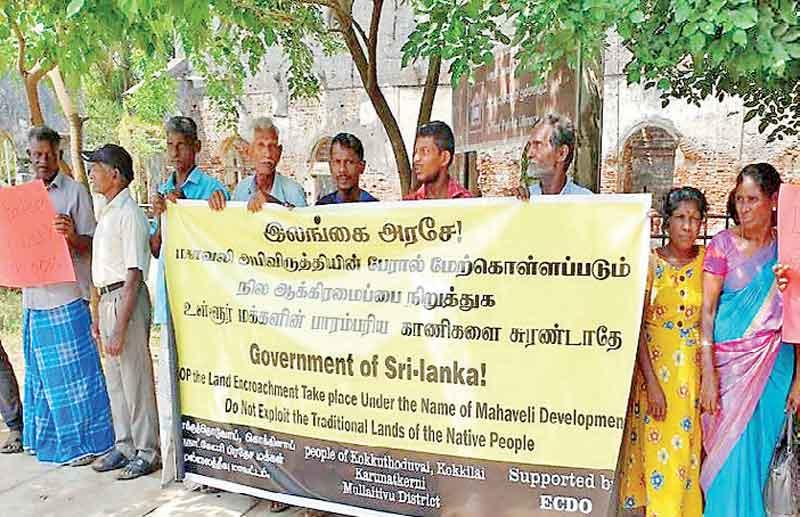Reply To:
Name - Reply Comment

A protest held in Jaffna where people are demanding the return of 1000 acres of land in Vanni. File photo
In a multiethnic and multireligious society like Sri Lanka, inclusivity is not merely symbolic; it is essential for addressing diverse perspectives and fostering mutual understanding.
The government’s success at the Presidential and General elections, which saw significant support from ethnic and religious minorities, highlights its mandate to address long-standing grievances. The predominantly Tamil and Muslim electorate in the north and east entrusted the government with resolving their issues directly. This trust needs to be met with tangible action.
The recent participation of Deputy Minister of National Integration, Muneer Mulaffer, at a conference on “Building a Peaceful Pluralistic Sri Lanka through Social Cohesion and Coexistence” emphasised the urgent need for inclusive governance in Sri Lanka. The event brought together over 150 participants, including clergy of all religions, civil society representatives, academics, and diplomats. Minister Mulaffer’s speech reaffirmed the government’s commitment to national integration and highlighted the importance of civil society in fostering reconciliation.
The conference organized by the Association of War Affected Women in collaboration with other civic organisations, including the Sangha for a Better Sri Lanka and the National Peace Council demonstrated the role that civil society can play to bridge gaps and foster understanding at grassroots level. The statement developed for the conference addressed crucial areas: political reforms, transitional justice, equal rights, historical injustices faced by the Malaiyaha Tamils, and good governance. This comprehensive framework reflects the aspirations of all communities for a just and united Sri Lanka.
In a multiethnic and multireligious society like Sri Lanka, inclusivity is not merely symbolic; it is essential for addressing diverse perspectives and fostering mutual understanding. The National Peace Council believes it is important to have members of the Tamil, Muslim and other minority communities appointed to important decision-making bodies, such as the newly appointed Presidential Task Force for a Clean Sri Lanka. Without such representation, from within the government or outside, the task force risks neglecting the very communities whose grievances need to be resolved equitably.
The challenges faced by these communities are many. Tamil families in the north and east continue to seek justice for lost lands, missing loved ones, and their right to communicate with the state in their own language. Malaiyaha Tamils, on whom the legacy of post-independence discrimination still weighs heavily, await the implementation of policies to grant them land and homes. Sri Lanka has a long history of providing remedies for the landless, using different strategies such as colonisation schemes, land reform measures, and massive housing programmes such as the million houses programme. Addressing these issues, starting with small, meaningful steps, can rebuild trust and pave the way for larger reforms.
Through further consultations and efforts to build bipartisan support, civil society aims to ensure that national reconciliation becomes a shared priority, unimpeded by political rivalries. President Anura Kumara Dissanayake’s commitment to conduct provincial council elections and take other progressive measures provides hope. For these efforts to translate into lasting reconciliation, the government must embrace the participation of all communities in governance and a governance model that reflects Sri Lanka’s plural identity.
The National Peace Council is an independent and non-partisan organization that works towards a negotiated political solution to the ethnic conflict in Sri Lanka.